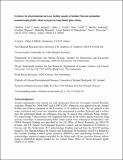Files in this item
Evidence for discrimination between feeding sounds of familiar fish and unfamiliar mammal-eating killer whale ecotypes by long-finned pilot whales
Item metadata
| dc.contributor.author | Curé, Charlotte | |
| dc.contributor.author | Isojunno, Saana | |
| dc.contributor.author | I Vester, Heike | |
| dc.contributor.author | Visser, Fleur | |
| dc.contributor.author | Oudejans, Machiel | |
| dc.contributor.author | Biassoni, Nicoletta | |
| dc.contributor.author | Massenet, Mathilde | |
| dc.contributor.author | Barluet de Beauchesne, Lucie | |
| dc.contributor.author | J Wensveen, Paul | |
| dc.contributor.author | Sivle, Lise D | |
| dc.contributor.author | Tyack, Peter L | |
| dc.contributor.author | Miller, Patrick J O | |
| dc.date.accessioned | 2020-06-21T23:35:37Z | |
| dc.date.available | 2020-06-21T23:35:37Z | |
| dc.date.issued | 2019-09 | |
| dc.identifier | 259378076 | |
| dc.identifier | fb700fa8-7384-4e90-a795-bd80749c95c9 | |
| dc.identifier | 31230140 | |
| dc.identifier | 85068167725 | |
| dc.identifier | 000480571100022 | |
| dc.identifier.citation | Curé , C , Isojunno , S , I Vester , H , Visser , F , Oudejans , M , Biassoni , N , Massenet , M , Barluet de Beauchesne , L , J Wensveen , P , Sivle , L D , Tyack , P L & Miller , P J O 2019 , ' Evidence for discrimination between feeding sounds of familiar fish and unfamiliar mammal-eating killer whale ecotypes by long-finned pilot whales ' , Animal Cognition , vol. 22 , no. 5 , pp. 863-882 . https://doi.org/10.1007/s10071-019-01282-1 | en |
| dc.identifier.issn | 1435-9448 | |
| dc.identifier.other | ORCID: /0000-0002-2212-2135/work/58984295 | |
| dc.identifier.other | ORCID: /0000-0002-8409-4790/work/60887822 | |
| dc.identifier.uri | https://hdl.handle.net/10023/20116 | |
| dc.description | Research funding was provided by the US Office of Naval Research, the DGA/TN (France), the UK Natural Environmental Research Council, and the Ministries of Defence of Norway and The Netherlands. PLT acknowledges funding received from the MASTS pooling initiative (The Marine Alliance for Science and Technology for Scotland). MASTS is funded by the Scottish Funding Council (Grant reference HR09011) and contributing institutions. CC acknowledges statistical support provided by the Multi-study OCean acoustics Human effects Analysis (MOCHA) project funded by the United States Office of Naval Research (Grant N00014-12-1-0204). | en |
| dc.description.abstract | Killer whales (KW) may be predators or competitors of other cetaceans. Since their foraging behavior and acoustics differ among populations ('ecotypes'), we hypothesized that other cetaceans can eavesdrop on KW sounds and adjust their behavior according to the KW ecotype. We performed playback experiments on long-finned pilot whales (Globicephala melas) in Norway using familiar fish-eating KW sounds (fKW) simulating a sympatric population that might compete for foraging areas, unfamiliar mammal-eating KW sounds (mKW) simulating a potential predator threat, and two control sounds. We assessed behavioral responses using animal-borne multi-sensor tags and surface visual observations. Pilot whales barely changed behavior to a broadband noise (CTRL-), whereas they were attracted and exhibited spyhops to fKW, mKW, and to a repeated-tonal upsweep signal (CTRL+). Whales never stopped nor started feeding in response to fKW, whereas they reduced or stopped foraging to mKW and CTRL+. Moreover, pilot whales joined other subgroups in response to fKW and CTRL+, whereas they tightened individual spacing within group and reduced time at surface in response to mKW. Typical active intimidation behavior displayed to fKW might be an antipredator strategy to a known low-risk ecotype or alternatively a way of securing the habitat exploited by a heterospecific sympatric population. Cessation of feeding and more cohesive approach to mKW playbacks might reflect an antipredator behavior towards an unknown KW ecotype of potentially higher risk. We conclude that pilot whales are able to acoustically discriminate between familiar and unfamiliar KW ecotypes, enabling them to adjust their behavior according to the perceived disturbance type. | |
| dc.format.extent | 20 | |
| dc.format.extent | 1162080 | |
| dc.language.iso | eng | |
| dc.relation.ispartof | Animal Cognition | en |
| dc.subject | Globicephala melas | en |
| dc.subject | Acoustic playbacks | en |
| dc.subject | Killer whale ecotypes | en |
| dc.subject | Heterospecific sound discrimination | en |
| dc.subject | Multi-sensor tags | en |
| dc.subject | Cetacean behavioral reponses | en |
| dc.subject | QH301 Biology | en |
| dc.subject | NDAS | en |
| dc.subject.lcc | QH301 | en |
| dc.title | Evidence for discrimination between feeding sounds of familiar fish and unfamiliar mammal-eating killer whale ecotypes by long-finned pilot whales | en |
| dc.type | Journal article | en |
| dc.contributor.institution | University of St Andrews. School of Biology | en |
| dc.contributor.institution | University of St Andrews. Sea Mammal Research Unit | en |
| dc.contributor.institution | University of St Andrews. Scottish Oceans Institute | en |
| dc.contributor.institution | University of St Andrews. Centre for Social Learning & Cognitive Evolution | en |
| dc.contributor.institution | University of St Andrews. Marine Alliance for Science & Technology Scotland | en |
| dc.contributor.institution | University of St Andrews. Sound Tags Group | en |
| dc.contributor.institution | University of St Andrews. Bioacoustics group | en |
| dc.contributor.institution | University of St Andrews. Institute of Behavioural and Neural Sciences | en |
| dc.contributor.institution | University of St Andrews. Centre for Research into Ecological & Environmental Modelling | en |
| dc.identifier.doi | https://doi.org/10.1007/s10071-019-01282-1 | |
| dc.description.status | Peer reviewed | en |
| dc.date.embargoedUntil | 2020-06-22 |
This item appears in the following Collection(s)
Items in the St Andrews Research Repository are protected by copyright, with all rights reserved, unless otherwise indicated.

